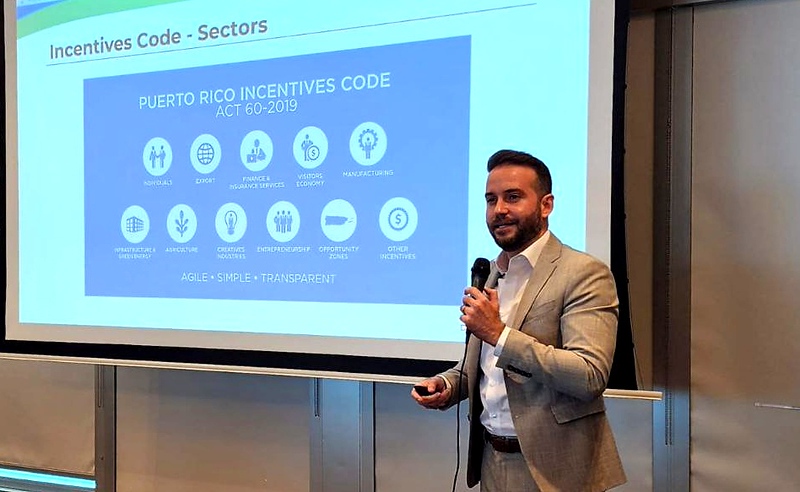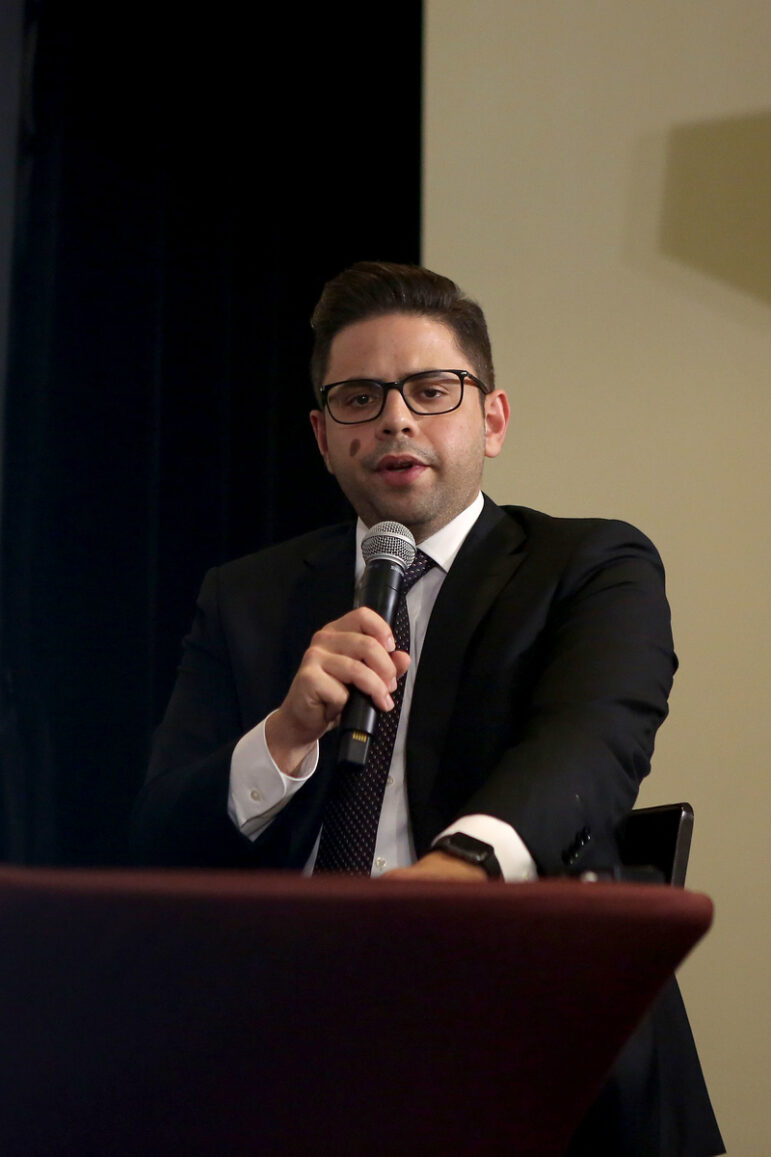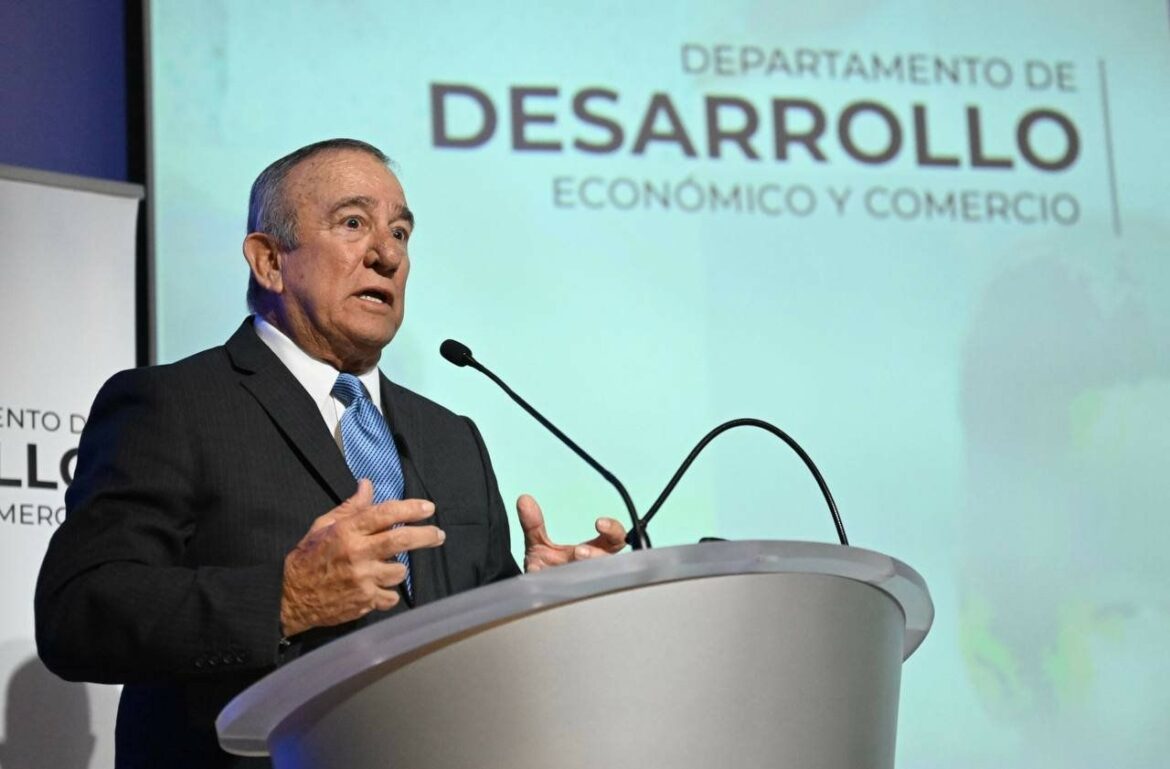Carlos Fontán refers to the 311 tax agreements that the Incentives office he heads in the Department of Economic Development and Commerce (DDEC) has attempted to revoke for noncompliance.
“This has allowed the Treasury Department — because the cancellations are retroactive — to initiate actions to recover more than $24 million in unpaid income taxes,” he said in an interview with the Center for Investigative Journalism (CPI, in Spanish).
But the number of 311 tax agreements, or “decrees,” is the same as that in August 2022. That is, it has been more than a year since the DDEC attempted to revoke an Act 22 decree due to noncompliance. Furthermore, among those 311, there are four cases in which the cancellation was reverted and another 29 whose revocation is not final due to unresolved appeals. There are 278 canceled decrees to date.

Photo taken from Facebook
Of the $24 million in taxes owed by those who lost their decree, it would be surprising if $3 million has been recovered, admitted Treasury Secretary Francisco Parés, who warned that collecting this debt is an uphill battle.
Since the incentive program began in 2012 up until 2020, the DDEC never verified whether Act 22 beneficiaries met the few requirements of the law: to submit an annual report, make donations to nonprofit entities, and reside in Puerto Rico. In March 2021, DDEC Secretary Manuel Cidre announced a compliance audit on each decree granted and warned that there would be a heavy hand against violators. He also vowed to make changes to Act 22 — now under Act 60 of the Incentives Code — to require more investment in Puerto Rico from those who get the benefit.
Two years later, none of this has happened, according to the CPI’s investigation. The law remains unamended, and the audit has not been completed, even though Fontán said at that time that “part of the process” would be completed at the end of 2021. Meanwhile, between the end of 2020 and February of this year, the number of “resident investors” receiving the tax benefit increased from 3,146 to 5,010, an increase of almost 60%.
A million-dollar audit that remains incomplete two years later
The CPI was able to identify at least 11 cases of Act 22 beneficiaries who have active decrees despite having been indicted or accused of irregularities in the handling of their businesses, tax evasion and for residing in other jurisdictions and not in Puerto Rico, as the incentive requires.
For example, “crypto tycoon” Brock Pierce claimed to be a resident of Vermont in 2021 when he considered running for the U.S. Senate while maintaining an Act 22 decree. As of today, Pierce still has an active decree, according to DDEC data.
In reference to reports of irregularities of Act 22 beneficiaries, Fontán said, “the press mentions mere allegations. In other words, I must revoke the cases for specific reasons established by law. I’ll give you an example: that the person does not reside in Puerto Rico. An allegation. The reality of the case is that this has to be proven, and I cannot revoke a decree so that the person — as they have the right to due process of law — goes to court, and then the court tells me, ‘That revocation is invalid.’” The official declined to comment on investigations of incentive beneficiaries carried out by his office. The agency declined to specify how many active investigations they have to date.
The DDEC has never revoked a decree for failure to comply with the residency requirement in Puerto Rico. Nor has it done so for other reasons, such as failing to notify their move to the island, not making the annual donation to nonprofit organizations, failing to comply with their tax liability, or requesting and obtaining the decree through fraud.
Fontán said the only cause for revoking decrees was failing to deliver the annual report. In this form, beneficiaries detail their income, financial assets, properties, businesses, and other personal data.
“We’re investigating the allegations made, and when reliable evidence and material facts are provided that enable us to revoke these decrees, we will do so,” he added.
Fontán said his office requires beneficiaries’ electoral information, driver’s license, income tax returns, and annual reports, which tells us how many days they spent in Puerto Rico.” Regarding the latter, the law requires at least 183 days a year, but this is not carved in stone.
“You can be here 160 days, for example, and still be a resident because you show that ‘due to the nature of my work, I had to travel, but my wife and my children are in Puerto Rico, I have a license in Puerto Rico, I have a boat in Puerto Rico.’ We ask for airplane ticket receipts, account statements, credit card statements, to verify that […] this person was definitely a resident of Puerto Rico,” he said.
The DDEC stated that it requires this documentation as part of the audit it has been carrying out since 2021.
To audit Act 22 beneficiaries, the DDEC hired Ecoval LLC, a financial consulting firm with offices in San Juan.
Incorporated in 2014 under Soria LLC — it changed its name to Ecoval in 2020 — the firm has secured over $25.7 million in contracts with 27 government agencies. Ecoval has added $4.9 million for services to the DDEC since April 2021, which includes auditing compliance with the decrees granted under Act 22 and other incentive laws.
The company’s chief officer is Eduardo Soria Rivera, a CPA, attorney, and political donor of the New Progressive Party (PNP, in Spanish). José Marrero, the former director of the Office of Management and Budget (OGP, in Spanish) under the Ricardo Rosselló Nevares administration, works for the company. Marrero awarded at least $665,000 in contracts to Soria LLC while at OGP.
In 2021, Soria Rivera was appointed by the court as a judicial administrator in the liquidation of JR Asphalt, an asphalt company contracted by the government, whose top officials pleaded guilty to corruption. Soria’s appointment came after the company’s owners recommended him for the job.
PPD shelves proposed changes to Act 22
Salil Zaveri, who got Act 22 benefits in 2016, killed a dog while playing golf in Río Grande. The “resident investor” was charged, found guilty and sentenced to one year in prison. His Act 22 decree was canceled, but the cause for revocation, rather than his criminal conduct, was his failure to file his annual report.
It’s unknown if his failure to comply with the filingt happened before he was convicted, since the DDEC never provided this information, despite multiple requests from the CPI. The agency only shared the names of the 278 people who lost their decrees and whose revocations became effective.
Like Zaveri, there are other cases of Act 22 beneficiaries accused of crimes, such as Raheel Naviwala (accused of Medicare fraud), Aaron Vick (accused of corruption over the sale of COVID-19 tests), and Rishi Shah and Shradha Agarwal (both convicted of investor fraud).
Unlike Zaveri, “resident investors” Naviwala, Vick, Shah and Agarwal are still listed as having valid decrees, the CPI found.
In May 2021, PNP Rep. Jorge Navarro Suárez, presented House Bill 790 to “add as a cause for revocation of a decree that the beneficiary be found guilty of a serious crime in Puerto Rico.” The measure has since been shelved in the House Judiciary Commission, chaired by the Popular Democratic Party (PDP, in Spanish) Rep. and House Speaker Rafael Hernández.
“We presented it and we lobbied for it to be admitted and subjected to public hearings. But it’s sitting there, in some drawer in some commission,” said Navarro, who supported the incentive “as long as a few adjustments are made” like the one he proposes.
The PNP representative discarded that the lack of action is due to lobbying against his measure, but rather because it is not a bill presented by the majority PPD delegation.
Despite the incentive’s systemic failures and calls to provide more powers to oversee these decrees, none of the bills that have been presented to amend the legislation have come to light. At least seven bills are waiting in the Legislature. Some propose eliminating the incentive, while others expand investment requirements and allow the cancellation of a decree if the person commits a crime.
One of them, Senate Bill 684 by PPD Senator Juan Zaragoza, “died from asphyxiation,” said its sponsor. The measure, which seeks to require greater investment and job creation, in addition to adding criminal conviction as a cause for cancellation, was referred to the Senate Economic Development Commission, then chaired by the former PPD Senator Gretchen Hau, and it has been there since.
“I followed up with her 200 times, she [Hau] told me she had instructions not to move it,” Zaragoza said. Who gave the instructions not to move it “is one of the mysteries of this building,” he added.
Zaragoza, who chairs the Senate Finance Commission, explained that after his bill was shelved, he joined as co-sponsor of a similar measure, PS 490, by PNP Senator Thomas Rivera Schatz. The House commission that Zaragoza chairs addressed the bill and approved it with amendments last May. Since then, it has been at the House Rules and Calendar Commission, chaired by PPD Senator Javier Aponte Dalmau.
“It’s dying of asphyxiation again. I’ve been waiting for months for a meeting with Aponte Dalmau on the matter, which was supposed to be on Monday. It didn’t happen. Yesterday, he told me he was going to see me; he didn’t see me. Every day, I follow up with him so he can tell me the plan: whether to kill it or put it to a vote. I don’t know what the ulterior motive is,” Zaragoza said.
On the other hand, the tax adjustment measure promoted by the Pierluisi administration does not contemplate changes to the incentive requirements under Act 22. The Governor announced in July that he would extend the tax benefit that Act 22 beneficiaries have to all residents of Puerto Rico.
“That’s the good side of the measure. The dark side is that, of the few requirements they had, now Act 22 [beneficiaries] won’t have any. The belief that it was necessary to give Act 22 strength and so on, the result [with the tax adjustment measure] would take away the only safeguard it has. Now the floodgates will open,” said Zaragoza.
Treasury: the economic interest lies with the IRS
Treasury Secretary Francisco Parés has a different point of view on the same question about the status of the oversight of Act 22. For him, “the economic interest in the decree revocations resides mainly with the IRS,” the U.S. Internal Revenue Service.

Photo by Gabriel López Albarrán | Centro de Periodismo Investigativo
Former Act 22, which is now under the Incentives Code of 2019, allows those foreigners who move to Puerto Rico and take advantage of the incentive, not to pay taxes on capital gains, interest, and dividends that they generate. This income, as a general rule, is taxed in the place of residence, in this case, Puerto Rico, where they receive a 100% exemption.
“But what happens if you can prove that the person is not a resident [of Puerto Rico]? Well, in essence, those capital gains would not have been taxed in Puerto Rico due to lack of jurisdiction. For this reason, the role of the Puerto Rico Treasury Department loses a bit of economic relevance, since, at the end of the day, tax collections would happen more at the federal level than at the state level,” said Parés.
In June, the IRS confirmed that they are investigating about 100 Act 22 beneficiaries for possible tax evasion, while anticipating the filing of charges at the federal level. To date, there is no known case in which the IRS has intervened with any Act 22 beneficiary over their decree in Puerto Rico.
When asked by CPI, the federal agency limited itself to confirming that they have identified almost 100 beneficiaries of Act 22 who are not complying with their tax responsibility at the federal level. The IRS further said that this action resulted from a campaign underway since February 2021 on beneficiaries of Act 22 who are not meeting applicable residence and source rules.
“These wealthy individuals are attempting to avoid U.S. taxation on U.S. source income,” the agency added in a written statement.
As for Parés, he said: “In practical terms, to look at this by numbers. Obviously, we all aspire for Puerto Rico to be a jurisdiction of law and order. Still, in numerical terms, if the IRS is already assuming the jurisdiction doing that investigation, then it makes sense — because it’s not like we have an excess of resources — to help them meet those goals.”.
The CPI directly asked the IRS the extent of the Puerto Rico government collaboration, but the federal agency did not answer this question.
The Treasury Secretary said it is very challenging to retroactively collect the tax debt of the canceled decrees since there are, for example, “people who no longer have a presence in Puerto Rico,” or whose bank accounts are off the island.
“That doesn’t mean that collection efforts are not made. They are sent notifications that they have tax debt and then seizure notifications are issued,” said Parés, who moments before said he would be surprised if the recovered amount exceeded $3 million.
On several occasions, the CPI requested the exact amount that has been recovered to date, but the agency failed to provide the information.



